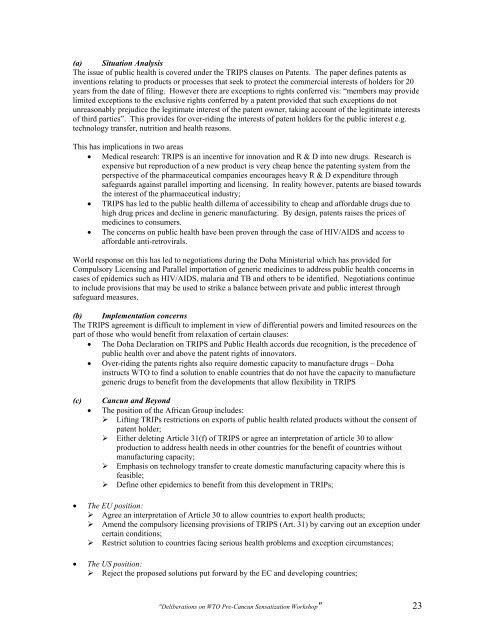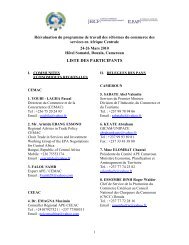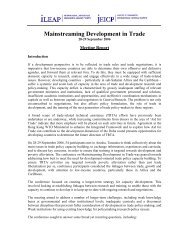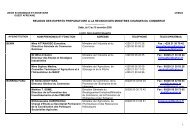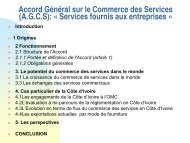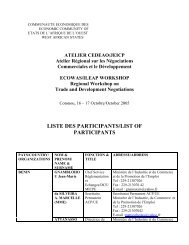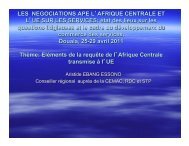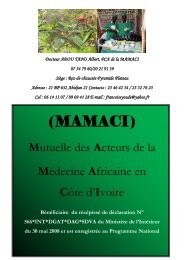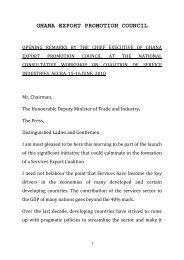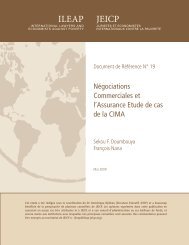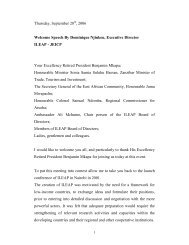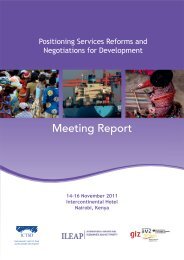Tanzania Report, Dar-Es-Salaam, Tanzania - ILEAP
Tanzania Report, Dar-Es-Salaam, Tanzania - ILEAP
Tanzania Report, Dar-Es-Salaam, Tanzania - ILEAP
You also want an ePaper? Increase the reach of your titles
YUMPU automatically turns print PDFs into web optimized ePapers that Google loves.
(a) Situation AnalysisThe issue of public health is covered under the TRIPS clauses on Patents. The paper defines patents asinventions relating to products or processes that seek to protect the commercial interests of holders for 20years from the date of filing. However there are exceptions to rights conferred vis: “members may providelimited exceptions to the exclusive rights conferred by a patent provided that such exceptions do notunreasonably prejudice the legitimate interest of the patent owner, taking account of the legitimate interestsof third parties”. This provides for over-riding the interests of patent holders for the public interest e.g.technology transfer, nutrition and health reasons.This has implications in two areas• Medical research: TRIPS is an incentive for innovation and R & D into new drugs. Research isexpensive but reproduction of a new product is very cheap hence the patenting system from theperspective of the pharmaceutical companies encourages heavy R & D expenditure throughsafeguards against parallel importing and licensing. In reality however, patents are biased towardsthe interest of the pharmaceutical industry;• TRIPS has led to the public health dillema of accessibility to cheap and affordable drugs due tohigh drug prices and decline in generic manufacturing. By design, patents raises the prices ofmedicines to consumers.• The concerns on public health have been proven through the case of HIV/AIDS and access toaffordable anti-retrovirals.World response on this has led to negotiations during the Doha Ministerial which has provided forCompulsory Licensing and Parallel importation of generic medicines to address public health concerns incases of epidemics such as HIV/AIDS, malaria and TB and others to be identified. Negotiations continueto include provisions that may be used to strike a balance between private and public interest throughsafeguard measures.(b) Implementation concernsThe TRIPS agreement is difficult to implement in view of differential powers and limited resources on thepart of those who would benefit from relaxation of certain clauses:• The Doha Declaration on TRIPS and Public Health accords due recognition, is the precedence ofpublic health over and above the patent rights of innovators.• Over-riding the patents rights also require domestic capacity to manufacture drugs – Dohainstructs WTO to find a solution to enable countries that do not have the capacity to manufacturegeneric drugs to benefit from the developments that allow flexibility in TRIPS(c)Cancun and Beyond• The position of the African Group includes:‣ Lifting TRIPs restrictions on exports of public health related products without the consent ofpatent holder;‣ Either deleting Article 31(f) of TRIPS or agree an interpretation of article 30 to allowproduction to address health needs in other countries for the benefit of countries withoutmanufacturing capacity;‣ Emphasis on technology transfer to create domestic manufacturing capacity where this isfeasible;‣ Define other epidemics to benefit from this development in TRIPs;• The EU position:‣ Agree an interpretation of Article 30 to allow countries to export health products;‣ Amend the compulsory licensing provisions of TRIPS (Art. 31) by carving out an exception undercertain conditions;‣ Restrict solution to countries facing serious health problems and exception circumstances;• The US position:‣ Reject the proposed solutions put forward by the EC and developing countries;"Deliberations on WTO Pre-Cancun Sensatization Workshop" 23


